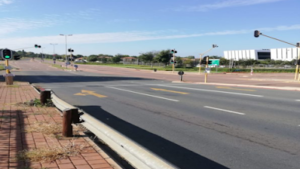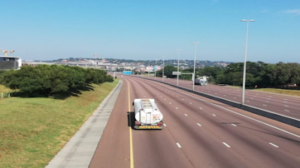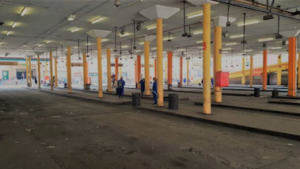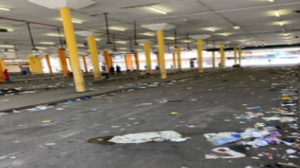 The first case of COVID-19 was reported on 05 March 2020 in South Africa, from the individual who had just travelled to Italy. The trace of contacts from the first confirmed case was conducted. Since then, the number of infections rose almost every day. More cases were continuously reported from the individuals who had travelled abroad, and later from the people with no travel history. Currently (5 April 2020) the country has 1655 confirmed cases and 11 deaths. South Africa has the highest number of infections in the African Continent. Nevertheless, some people still do not take the COVID-19 issue seriously. They are still roaming around the streets, regardless of the regulations that has been put by government to curb the spread of the virus.
The first case of COVID-19 was reported on 05 March 2020 in South Africa, from the individual who had just travelled to Italy. The trace of contacts from the first confirmed case was conducted. Since then, the number of infections rose almost every day. More cases were continuously reported from the individuals who had travelled abroad, and later from the people with no travel history. Currently (5 April 2020) the country has 1655 confirmed cases and 11 deaths. South Africa has the highest number of infections in the African Continent. Nevertheless, some people still do not take the COVID-19 issue seriously. They are still roaming around the streets, regardless of the regulations that has been put by government to curb the spread of the virus.
Background
On 15 March 2020, the President of the Republic of South Africa Mr. Cyril Ramaphosa declared the country as a National State of Disaster, few days later declared as a state of emergency due to the rising cases of infections. On 24 March 2020, the President announced a 21 day-national lockdown which started on 27 March 2020 in order to curb the spread of the virus. Only essential services (healthcare services, supermarkets, security services, pharmacies etc.) are allowed to operate during the lockdown. As this is the first time in history to happen in the country there are still some challenges with regards to the implementation of the lockdown regulations. So, government had to review and relax some of the lockdown regulations.
My institution is closed, we are working from home. However, few officials for essential services have to report to work. Therefore, I’m quarantining myself, I only go out when I really have to. I’m using a homemade mask when necessary as almost all shops don’t have masks at all since February 2020.
State of emergency
Various citizens were trapped in the country and some South Africans in other countries when the regulations to curb the virus were declared and implemented, also during the lockdown. Therefore, they had to be repatriated back to their respective countries. Among them, the number of German citizens was very high (5000+). Some of them were already infected with corona virus and had to be quarantined before they were repatriated.
Impacts and benefits of COVID-19 in South Africa
Economy
Like all other countries COVID-19 has put country’s economy under stress. Most businesses, both small and big are closed during the lockdown period. Therefore, government has to device some strategies to subsidize small business. Some employees do not get their salaries during the lockdown, employers have to consider UIF (Unemployment Insurance Fund) to compensate the employees.
On 27 March 2020 South Africa has been downgraded to junk status by one of the rating agency. It is the first time in 25 years that South Africa is being downgraded to junk status. However, the SA economy was already unstable even before the corona virus. But it will be worsened due to COVID-19.
Under certain circumstances government is forced to make quick decisions and financial commitments in order to curb the spread of virus. Some of these commitments are long term, and might have to be implemented even beyond the COVID-19 event. However, due to financial constraints that the country is facing, it might be impossible to fulfil the commitments. Also these commitments might put the country in worse debt going forward.
Environmental /Ecological benefits

People are getting used to practice hygiene since the COVID-19 pandemic has been announced. There is less movement of people since the lockdown. Most parts of the country are starting to witness the cleanliness of the public areas as there is less to near zero littering during the lockdown period. Since many industries are closed, there is less air pollution. Also the movement of transport is very limited, therefore emissions will be slightly reduced. The protected areas (game and nature reserves) are under lockdown. Therefore, there are no safaris and the biodiversity is at peace.
Socio-economic
It is anticipated that lot of people will lose jobs, including high number of retrenchments which will lead to poverty due to COVID-19. The country has a high number of homeless people that government has to care of during the lockdown. This might stretch the budget even further.
Culture
It is the first time in history that the country is locked down. So lot of events have been postponed or cancelled. In South Africa it is a norm that Christians celebrate and gather for church conferences during Easter. So it will be the very first time for Christians not to attend church conference during Easter. Pastors are encouraged to conduct online church services which might not be conducive for everyone due to technology challenges. Some people especially blacks, perform rituals, parties and events during Easter, whereas some go for holidays. However, COVID-19 has distracted all cultural plans.
Political
Political parties have put aside their differences and are working together to defeat the “invisible enemy” corona virus. Solidarity is practiced within the country.
Trade
Trade (imports and exports) occurs at a very small scale, under the very strict conditions, and only on essential services during the lockdown. This has negative impact on the economy of the country.
Public committees
An Inter-ministerial COVID-19 committee is working around the clock and are holding press conference every day since the lockdown in order to update public on the proceedings on all matters pertaining to the pandemic. At the same time they are out in the field to monitor the implementation of the lockdown rules. So this is the best platform to get an update.
Future of global cooperation and sustainable development
The future of global cooperation and MGG itself might be jeopardized due to COVID-19. This might be due to suspension of international flights which might last longer than expected. If that is the case, international meetings might not take place anytime soon. The whole world might be under recession, as a result no country will be in a position to rescue another for a moment. I think, the possibilities of budget that has been put aside for global cooperation issues to be transferred to cover gaps that have been opened by COVID-19 are high. No one is certain as to how long this pandemic will last. Maybe it’s about time we start advancing on technology and to fully embark on 4th industrial revolution to make sure that all plans still continue even under this situation.
From my point of view, it is unlikely for most of the countries to achieve the target of Sustainable Development Goals (SDG) by 2030. Around 10 of 17 SDGs will be disturbed due to COVID-19, as it strike direct on them. These include poverty, erase hunger, good health and well-being, quality education, decent work and economic growth etc. Maybe there will be a need for United Nations and affected countries to go back to the drawing board to revise the targets.
Challenges

 It is still a challenge to practice social/physical distancing in some parts of the country especially in dense populated areas and in informal settlements. Some people still have to be outside on certain days to get their social grant and for essential services during the lockdown. Whereas some defy the lockdown regulations, resist to be quarantined and self-isolation. Some are just on the streets for invalid reasons. Therefore, government has to intervene and enforce the law. Lack of basic resources such as Personal Protective Equipment (PPE) and sanitizer create fears as health workers and unions are starting to complain about it. If this is not addressed anytime soon, they might decide to go on strike and that could lead to a big crisis as there will be a shortage of staff. However, the President is engaging countries like China, Germany for supply.
It is still a challenge to practice social/physical distancing in some parts of the country especially in dense populated areas and in informal settlements. Some people still have to be outside on certain days to get their social grant and for essential services during the lockdown. Whereas some defy the lockdown regulations, resist to be quarantined and self-isolation. Some are just on the streets for invalid reasons. Therefore, government has to intervene and enforce the law. Lack of basic resources such as Personal Protective Equipment (PPE) and sanitizer create fears as health workers and unions are starting to complain about it. If this is not addressed anytime soon, they might decide to go on strike and that could lead to a big crisis as there will be a shortage of staff. However, the President is engaging countries like China, Germany for supply.
Hospitals are under resourced, there is less space, less ventilators etc. mainly in rural areas. Some rural residents are far from the health facilities. So that might be a disaster if the number of infections spread and increase in these areas. Government might not cope with the situation. Hence, it’s important to emphasize the preventive measures of “stay at home” to our societies. Nevertheless, the situation seem to be under control for now. Some people are expecting government to handout masks and sanitizers for free whereas it is a challenge even for the frontline staff.
Conclusion
Most countries are worried about declining of the economy due to COVID-19. However, we have to ask ourselves as to what is important between people’s lives and economy. From my point of view, staying at home and physical distancing is the best strategy to curb the spread of virus. As the time goes on, hopefully people will get used to it and to the term “corona virus” as some elders still call it “corosa varum/various’’.
Can everyone be safe during this trying time until we meet again alive!!

Schreibe einen Kommentar